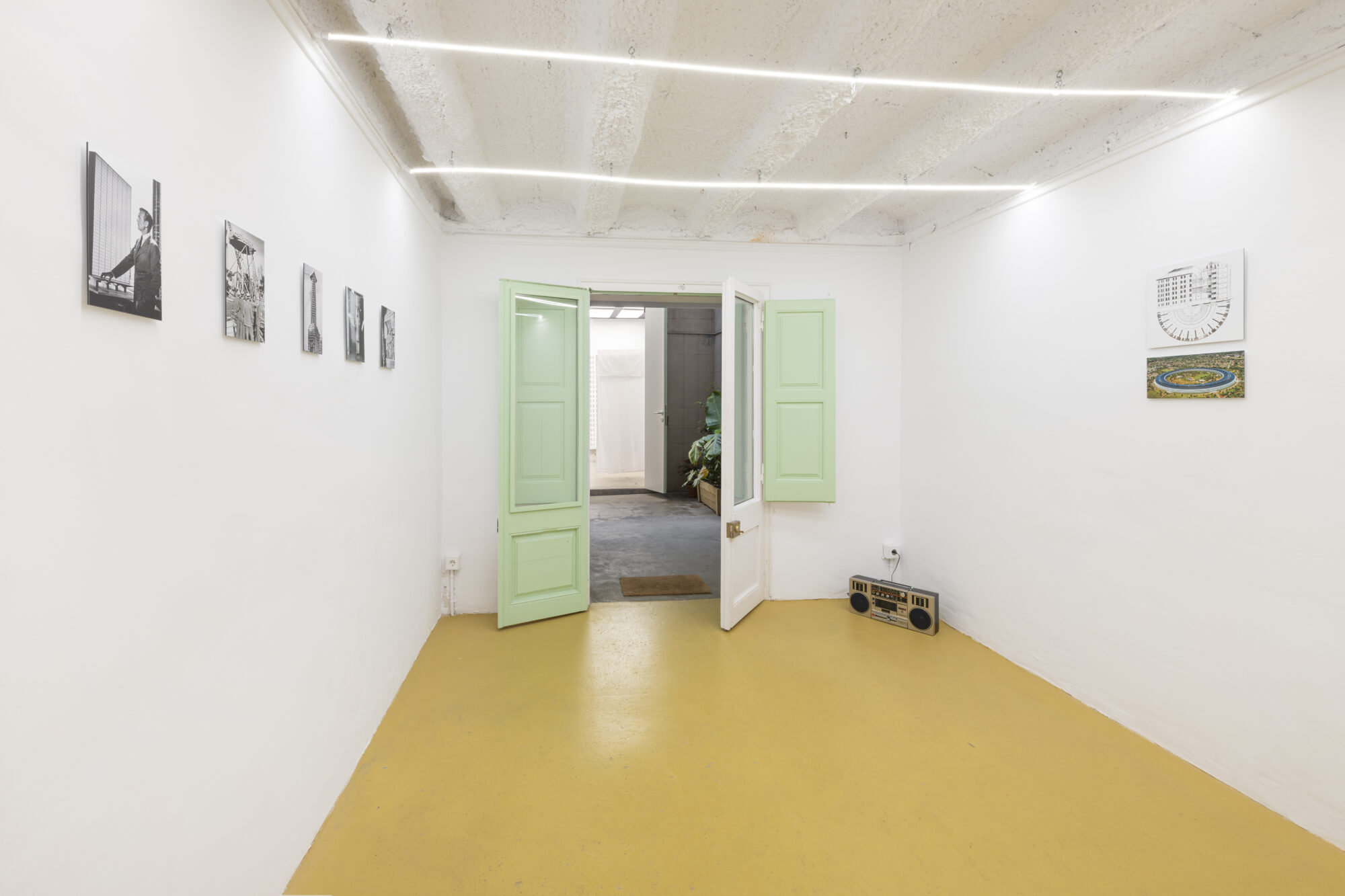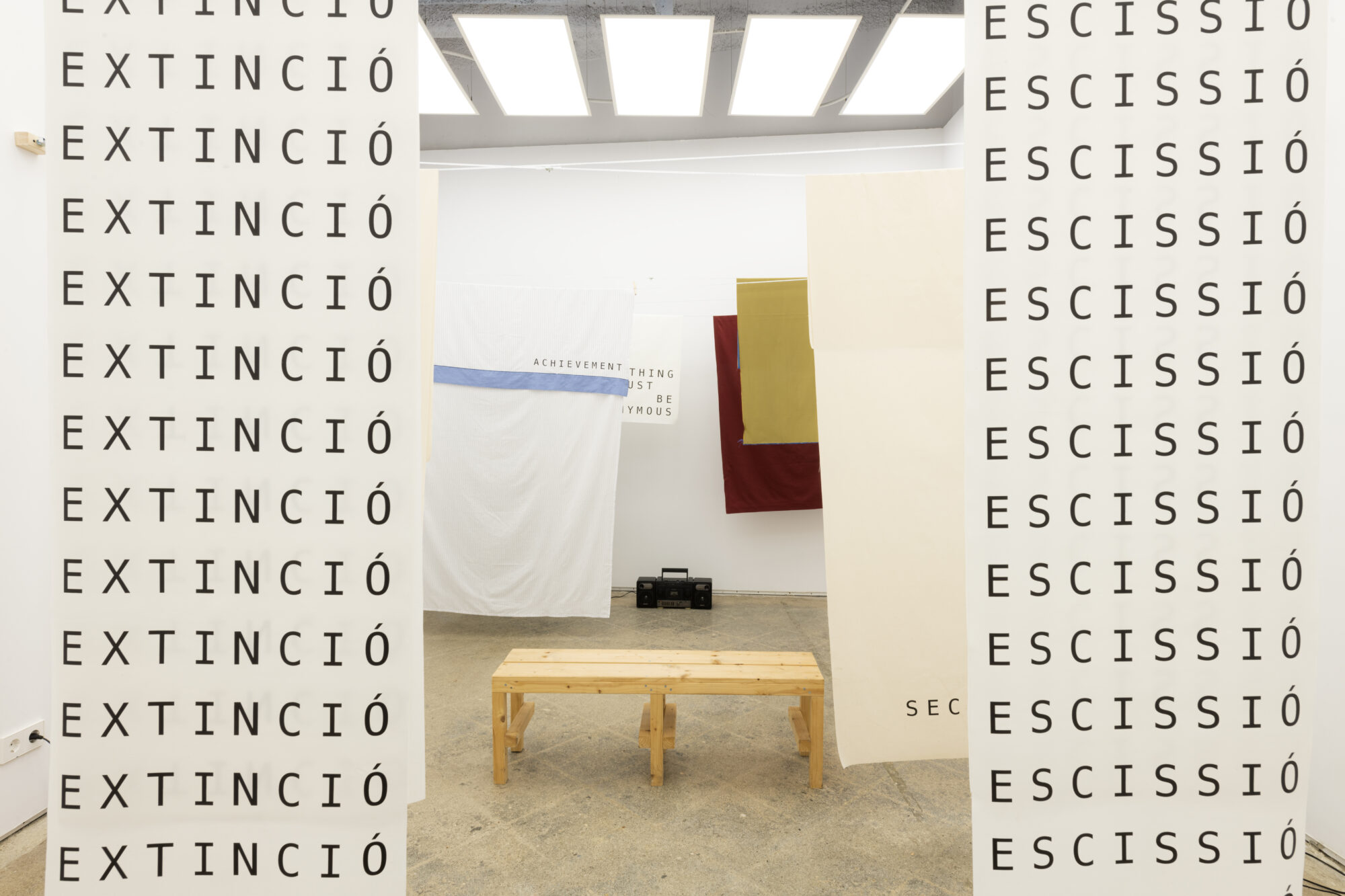The Green Parrot and Chiquita Room present a dual exhibition by poet and sound artist Eduard Escoffet, his first solo show in the city of Barcelona. It is also the first time the two Barcelona-based galleries present a joint project. The exhibition is the result of two years of research into rationalist architecture and degrowth against the backdrop of experimentation with sound and everyday objects. The exhibition is divided into two parts: the first in Chiquita Room, under the title Faula [Fable], and the second at The Green Parrot, under the title Esdeveniments [Events]. The first explores the ideals that enable the exacerbated individualism of the twentieth century, while the second looks at the details of what has brought us to this point. Made up of diverse sound installations, the exhibitions as a whole address the myth of indefinite growth and the material limits of life on this planet.
The film The Fountainhead was released in 1949 and was directed by King Vidor starring Gary Cooper as Howard Roark, an ambitious architect who wants to make his mark on the world of architecture despite the reluctance of his surroundings. Based on the novel of the same name by Ayn Rand, the film uses modern architecture as an excuse for a libel against communism and, above all, a plea in favour of individualism and capitalist competitiveness. This is the starting point of this dual exhibition project, which aims to address the role of the individual in a fragile and interdependent world: if the capitalist euphoria of the 20th century pushed Ayn Rand to draw an isolated and victorious Roark in the face of the masses, the climatic pessimism of the 21st century forces us to dilute her genius in the commonplace and to question her epic narrative.
The project questions neoliberal individualism and the obsession with growth and, like the film and Rand’s book, it starts from architecture. The Fountainhead argues that architecture can only advance by virtue of the few who must fight against the conservative inertias of the masses, and in the exhibition, the column is the element that serves both to expose the obsession with growth and the need to think of architecture (and ecosystems) as complex ensembles in which isolated elements do not work: a column needs to support something.
As with text, Eduard Escoffet displaces and assembles everyday objects to make them speak: he proposes a new syntax without creating new writing or generating new objects. At a time when digitalisation threatens to liquidate the object and materiality, the poet focuses on the body of writing and everyday objects to deal with circularity, interdependence, and human fragility. This same idea has inspired the production of the exhibition, which has been constructed with objects bought in neighbourhood shops and local materials. The result is a dual exhibition in which sound, writing, and objects create new spaces to rethink the role of the individual in the present moment.
Eduard Escoffet (Barcelona, 1979)
Poet and sound artist based in Barcelona. He has presented his proposals in centres and festivals such as the Centre Pompidou, Palais de Tokyo, and the Cartier Foundation in Paris, Poesiefestival Berlin, Bowery Poetry Club (New York), Centro Cultural São Paulo, Sónar Barcelona, Museo Reina Sofía (Madrid), Roma Poesia, Poetry Africa (Durban, South Africa) and Museo del Chopo (Mexico City), among many others. In 2022 he presented the performance Utopia i esclavatge (Utopia and Slavery) at La Capella, as part of BCN Producció.
He has published poetry books like Gaire (2012), El terra i el cel (2013, published by Arrebato Libros in Spanish in 2018) and Menys i tot (2017). In 2021 he published the poster-poem Plançó (Carles Hac Mor Prize) and in 2022, Cuciture, an anthology of his poetry translated into Italian (Argo Libri). Together with the electronic band, Bradien, with whom he collaborated between 2009 and 2016, he released the albums Pols (2012) and Escala (2015). He is currently a member of the group Barba Corsini, with whom he released the album Un nou incendi (2021). In 2019 he made the film Cos endins with the Italian video artist Gianluca Abbate, which received the Goethe Prize at the Zebra Poetry Film Festival in Berlin. He was also a finalist in 2018 for the Bernard Heidsieck Prize, awarded by the Centre Pompidou and the Fondazione Bonotto.
Escoffet also teaches sound poetry for the master’s degree in Sound Art at the University of Barcelona. Between 2010 and 2012 he was co-director of Barcelona Poesia (Barcelona International Poetry Festival) and between 2000 and 2004 director of PROPOSTA festival, which is dedicated to experimental poetic practices held at the CCCB. He currently directs the Festival Poesia i +, which is organised by the Fundació Palau de Caldes d’Estrac in various municipalities in the Maresme region. He also curated, with Eugeni Bonet, the cycle Próximamente en esta pantalla on lyricist cinema at the MACBA (2005). In 2019 he curated the exhibition La red en el bosque. Joan Brossa y la poesía experimental, 1946-1980.


















